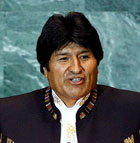FCNNEWSSOURCE

Photo:UN Photo/Marco Castro
UNITED NATIONS – Speaking at a press conference after his address to the UN General Assembly, Bolivian President Evo Morales said a “great feeling” of liberation is sweeping Latin America and cannot be stopped.
“The combat of our people is a historic struggle against empire,” he told reporters. “Where there is imperialism, all you find is exploitation and the pillaging of natural resources. With no imperialism, there is development, justice and there is freedom.”
Latin America has changed and the United States must get used to it, wrote Larry Birns, director of the Washington-based Council on Hemispheric Affairs, in an analysis of relations between Latin America and her northern neighbor posted on the think tank’s website. “The Bush administration, distracted by the war in Iraq, gave the region the required space to develop its own consensus on regional developments; coming up with new formulas in its quest to diversify relationships; pluralizing its world trade contracts and engaging in constructive relations across the board,” Mr. Birns continued.
While the administration for the past eight years basically ignored Latin America, “more left-leaning presidents were elected” than ever before in the history of the Americas; and a plethora of regional organizations that did not include the U.S. as a member were formed, he noted. “The region suddenly saw a rise in its importance on the world stage as its metal and agricultural commodities increased in relevancy and value during the current fuel and food crisis, and new links emerged between Latin America, India, China, Russia, and the European Union,” wrote Mr. Birns.
President Morales told reporters Sept. 23 that Latin American nations were now able to build their own partnerships and unions based on respect for differences, peace, dialogue and dignity. “The Union of South American Nations had been created precisely so that Latin America would no longer be the back garden of the empire. Unlike other international organizations, such as the Organization of American States, UNASUR is managed completely by South American countries; and no longer are trips to Miami or New York required to solve our problems,” the Bolivian president said.
Alimany Bakarr Sankoh, president of the Hugo Chavez International Foundation for Peace, wrote in a different analysis that no amount of intimidation or terrorism, be it political or economic terrorism, can shake the confidence of the people of Latin America toward their governments. “Clearly, the control of the wealth of Latin America” is at the root of U.S. hatred “for Venezuela, Ecuador, Paraguay, Bolivia and Cuba,” Mr. Sankoh wrote.
During his address to the General Assembly, Foreign Minister Samuel Lopez said, “Nicaragua aimed to overcome poverty” and “its citizens would help redefine the country’s path to doing so.”
Fernando Lugo Mendez, president of Paraguay, told the General Assembly his new administration, which had come to power on Aug. 15, realized citizens voted for greater social justice. “Political and economic stability are not more important than social stability and I am committed to applying policies that will combat extreme poverty,” he said.
Michelle Bachelet Jeria, Chile’s president, agreed there was a growing demand for democracy among the people of Latin America. “South American nations have learned that we can work together to solve any crisis and we have a strong desire to leave the dark history of our past behind,” she said.
Guatemala’s president said his nation was giving social policy the scope and strength it deserved, moving forward programs that served the poorest regions of his nation. “We are working extremely hard in the regions inhabited by the 23 indigenous communities that constitute the majority of Guatemala’s population. The programs aim to establish a system of wealth distribution and social justice,” said President Alvaro Colon Caballeros.
It is clear the U.S. remains “largely oblivious” to the multifaceted developments that are taking place in an increasingly self-confident Latin America, wrote Mr. Birns. “It may be too late for Washington to develop cooperative and mutual beneficial policies,” he added.
Related links:
- Indigenous groups back Bolivia’s leader (FCN, 10-08-2008)
- From Venezuela; A Message of Solidarity (FCN, 01-01-2007)
- North American tribal leaders energized by Morales meet (FCN, 10-23-2006)
- Evo Morales and the roots of revolution (FCN, 02-07-2006)












